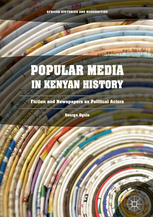

Most ebook files are in PDF format, so you can easily read them using various software such as Foxit Reader or directly on the Google Chrome browser.
Some ebook files are released by publishers in other formats such as .awz, .mobi, .epub, .fb2, etc. You may need to install specific software to read these formats on mobile/PC, such as Calibre.
Please read the tutorial at this link: https://ebookbell.com/faq
We offer FREE conversion to the popular formats you request; however, this may take some time. Therefore, right after payment, please email us, and we will try to provide the service as quickly as possible.
For some exceptional file formats or broken links (if any), please refrain from opening any disputes. Instead, email us first, and we will try to assist within a maximum of 6 hours.
EbookBell Team

4.0
96 reviewsThe book examines popular fiction columns, a dominant feature in Kenyan newspapers, published in the twentieth century and examines their historical and cultural impact on Kenyan politics. The book interrogates how popular cultural forms such as popular fiction engage with and subject the polity to constant critique through informal but widely recognized cultural forms of censure. The book further explores the ways we see and experience how the African subaltern, through the everyday, negotiate their rights and obligations with the self, society and the state. Through these columns and their writers, the book examines the tensions that characterize such relationships, how the formal and informal interpenetrate, how the past and present are reconciled, and how the local and transnational collide but also collude in the making of the Kenyan identity.